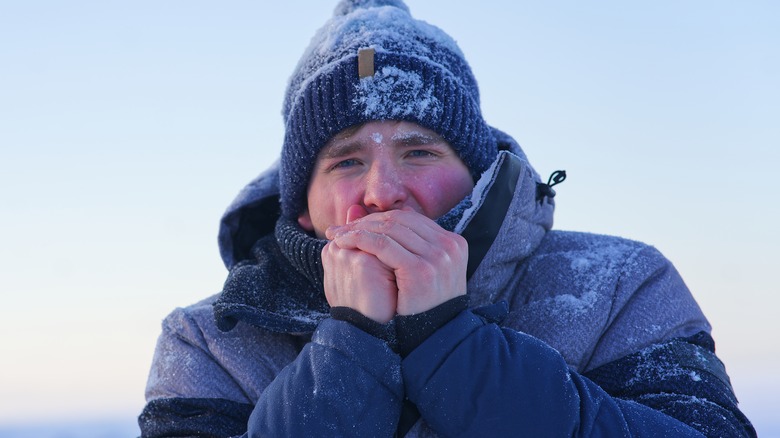Does Shivering Help You Burn Fat Faster?
Standing outside in freezing temperatures or stepping out of the shower into a cold room can feel uncomfortable, but your body has a mechanism to help you warm up. When your core temperature dips, the body begins shivering, prompting muscles to rapidly contract and relax (per Healthline). Princeton University's Outdoor Action Program explains that visible shivering can raise the production of surface heat by up to 500%, though this effect only lasts for a few hours at most.
The body may also shiver as a result of certain health conditions, according to MedicalNewsToday. These can include psychogenic movement disorders, essential tremors, hypoglycemia, and some infections. Additionally, you may notice shivers if you have a fever, if you feel stressed, or if you feel anxious.
Shivering is a natural response that kicks in to regulate the body, but it may have another inadvertent benefit: weight loss. Some research suggests that shivering can aid in burning a specific type of fat. Here's what the science says and what the findings could mean for your weight loss goals.
Shivering speeds up fat burning in the body
You may have heard that wearing a garbage bag or sauna suit while working out can help shed extra pounds. The idea is that, by trapping body heat, more sweat is generated, reducing water weight (per Insider). However, rather than dialing up the temperature to lose weight, the trick may be to lower it instead.
A 2014 clinical trial published in Cell Metabolism found that shivering from cold exposure prompts the secretion of irisin, a hormone that stimulates energy-storing white fat cells to behave as energy-burning brown fat cells. The trial also confirmed that the hormone is released during exercise.
In short, shivering can burn fat in a way similar to working out — but does this mean you should trade your treadmill for more time in frigid temperatures? Not quite, says the study's lead researcher, Paul Lee. Lee told the Washington Post that while shivering may be effective for short-term fat burning, it stresses the body, which may have negative health consequences. Aaron Cypess, a clinical investigator at the National Institute of Diabetes and Digestive and Kidney Diseases, also added that shivering increases blood pressure, potentially damaging blood vessels.
An alternative is to expose yourself to cool — not cold — temperatures. A 2013 study published in The Journal of Clinical Investigation showed that people exposed to mild cold (62.6 degrees Fahrenheit) for two hours each day still burned more fat than those exposed to warmer temperatures.


